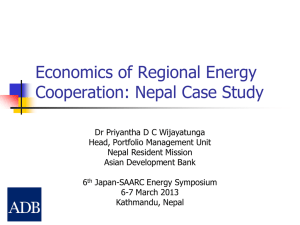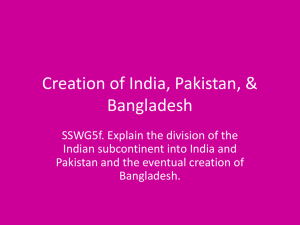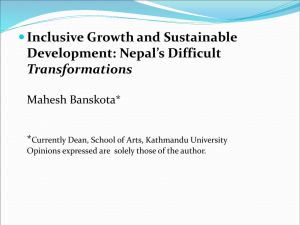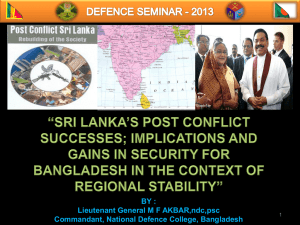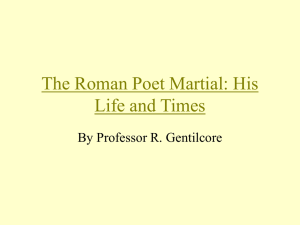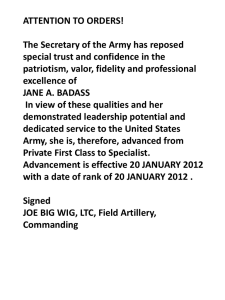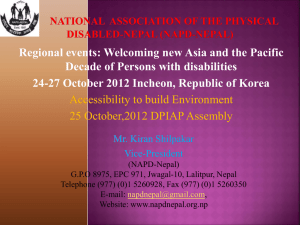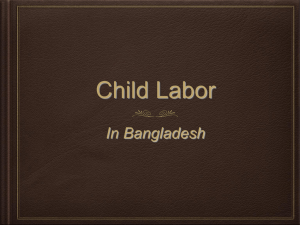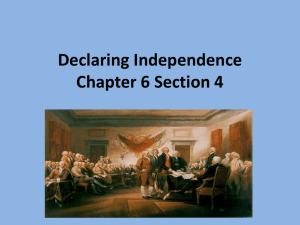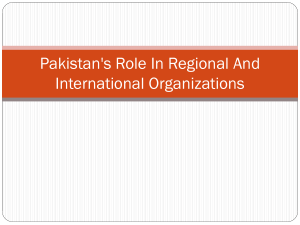Mr. Jha - Office of the High Commissioner for Human Rights
advertisement
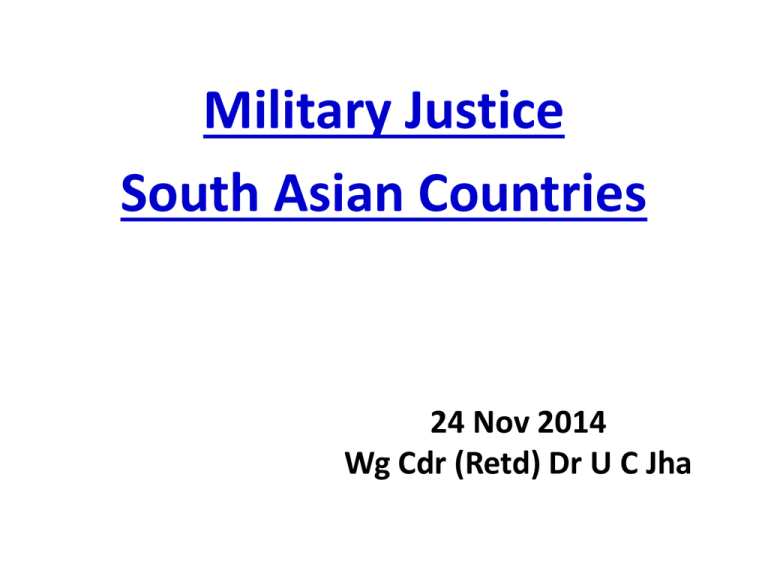
Military Justice South Asian Countries 24 Nov 2014 Wg Cdr (Retd) Dr U C Jha Military Justice: South Asian Countries Pakistan Nepal India Maldives Bhutan Bangladesh Sri Lanka Military Force: South Asia Army Bangladesh Bhutan India Maldives Nepal 126,000 Air Force Navy 14,500 16,000 120,000 55,000 10,000 1,100,000 4,200 69,000 MCG 650 (Army-Air Wing) Pakistan 550,000 45,000 22,000 Sri Lanka 200,000* 18,000 15,000 South Asia: 2.4 million military and 1.6 million paramilitary—governed by an ancient legal system. Induction in the military is voluntary. Women working in non-combat arms. Contribute 33 % of the force for UN Peacekeeping (Oct 2014). Two are nuclear weapon states. Ratification of Human Rights Treaties Bangladesh India Nepal Pakistan Sri Lanka ICCPR/ICESCR CRC OP to CRC Child Soldier SNR CEDAW CAT SNR Enforced Disappearance X SNR X X X Treaty SNR: Signed but not ratified Ratification of IHL Treaties COUNTRY Geneva AP I of Conv. I- 1977 IV AP II of 1977 Rome Ottawa Statute Treaty of ICC APM Bangladesh India X X X X Nepal X X X X Pakistan X X X X Sri Lanka X X X X 1. Military Justice Systems 2. Security laws giving special powers to armed forces. 3. Judicial interventions. 4. Recommendations. 1. Military Justice System: SA Countries • The British Indian military law of 1911 is the progenitor of the SA military legal systems. • Fundamental rights of the armed forces-restricted by the Constitutions. • Each wing of the military has independent legal system. • Action against military offender is by way of summary trial and ad hoc military tribunals or court martial. A. Summary Trials • For the officers up to the rank of Major and other ranks. • Accused is not entitled to legal help. • Law of evidence does not apply and proceedings are not open to public. • No right to appeal. Summary punishments (Officers and JCOs): • Forfeiture of service/seniority up to 12 months; • Stoppage of pay & allowances; • Reprimand. Personnel below JCO rank: • Imprisonment and detention up to 28 (42) days; • Field Punishment; • Extra duties; • Fine, deprivation of rank; • Reprimand. Rope around post only Bangladesh India (AF) Nepal Pakistan Sri Lanka Method of tying feet Field Punishment Number One B. Court Martial General District Court Martial Court Martial Summary/Field General Court Martial Summary Court Martial Bangladesh India Nepal Pakistan Sri Lanka X • General and Summary General Court Martial can award death sentence (except Nepal). • In Pakistan a military offender can be stoned to death: AA s 60/70/ 80. • In Nepal a GCM may award life imprisonment and confiscation of the entire share of the ancestral property (offences relating to the enemy, mutiny and desertion). Other punishments in descending order: • Amputation of hand, foot or both (in Pakistan); • Life imprisonment; • Imprisonment up to 14 years; • Whipping (in Pakistan); • Cashiering in the case of officers; • Dismissal; • Field punishment; • Reduction to ranks and forfeiture of service; • Stoppage of pay & allowances; • Reprimand. • • • • • Trial in GCM and DCM Ad hoc military tribunals; The members of court martial (officers) are detailed by convening authority; Judge Advocate must only in a GCM; In Sri Lanka prosecution as well as the defence can be represented by a counsel; Findings of court and sentence are subject to confirmation by convening authority. • • • • • Summary/Field General Court Martial Can be convened on active service or during peace; Composition: three officers with one year service; Judge advocate not a must; Statement of offence may be made briefly to disclose an offence; Can try any individual and award punishment up to death (with concurrence of all members). • • • • • Summary Court Martial (SCM) Origin: the 1857 mutiny in India. The CO alone conducts the trial for accused (up to senior NCOs). The trial is brief and accused has no right to counsel or defending officer. Punishment: 1-year imprisonment and dismissal. No review of punishment (appeal in India since 2009). Confirmation, Revision, and Appeal • Pre and post-confirmation petition by accused to confirming authority--but no right to participate. • Finding and sentence may be once revised by order of confirming authority. • No right to appeal (now available in India). Role of Judge Advocate General (JAG) • JAG is a military executive appointed by the chief of the staff—he has no functions of an advocate or of a judge. • Remains under the functional control of the convening authority. • Since not independent, they cannot be expected to give a fair and just opinion. C. Powers of Convening Authority Who shall be tried; Charges; Composition of the court; JA, prosecutor and defending officer remain under his command; Confirms finding and sentence; Can send back the proceeding for revision; Decides post-confirmation petitions. There is NO RIGHT to appeal against his decision. Appeal: The Armed Forces Tribunal in India • The Tribunal and its Benches are functioning since August 2009. • It has original jurisdiction over service matters and appellate jurisdiction over court martial. • Decided 5500 cases in the last 5yrs. • Lacuna: The Tribunal cannot get its orders executed by way of civil contempt. • An appeal against order of the Tribunal to be filed in the Supreme Court. • 2012 Amendment to the AFT Act to give it civil contempt power was resented by the armed forces. 2. Security and Anti-terrorism Laws: South Asian Countries • The armed forces in the SA countries have been deployed in ‘aid to civil power’ to deal with terrorism and militancy. • The Security and Anti-terrorism laws have given additional powers to the armed forces. • Bangladesh: The Armed Forces (Special Powers) Ordinance, 1942. • India: The Armed Forces (Special Powers) Act. • Nepal: The Terrorists and Disruptive Activities (Control & Punishment) Ordinance. • Pakistan: Suppression of Terrorists Activities (Special Court) Act and Special Military Court during Martial Law regime. • Sri Lanka: Public Security Ordinance and Prevention of Terrorism Act. The members of the armed forces have been accused of: Enforced disappearances / extrajudicial executions. Illegal imposition of curfew. Rape and sexual harassment. Killing of protected persons. Arbitrary detention and torture. 3. Judicial Interventions and Inactions Bangladesh • The Rapid Action Battalion (RAB), a special police force has been accused of over 800 killings in last 10 years. • A number of RAB commanders are officers seconded from the army and Government has not taken any action against violators. • Human Rights Commission does not have any mandate to take action against “discipline” forces (includes army). BDR Mutiny • In February 2009, Bangladesh Rifles, a paramilitary force on a two-day mutiny killed 74 people (57 army officers) and committed rapes. • A number of victims were dumped in sewers and shallow graves. • The accused were tried in special civil courts. • The Court has awarded 152 death sentences, 161 life sentences and 262 sentences of 3-10 years imprisonment--under appeal process. • Reasons of mutiny: low pay, no perks, no participation in UN peacekeeping—lack of effective grievance redress machinery. Nepal • The 2013 Ordinance ‘On the Investigation of Disappeared Persons, Truth and Reconciliation Commission’ has been struck down by the Supreme Court. • Torture and enforced disappearance have not been criminalized despite a Supreme Court order of June 2007. • No military person has been prosecuted for human rights abuses committed during conflict which lasted for 10 years. • In January 2013, Colonel Lama of Nepal Army, deputed to UN peacekeeping was arrested by the police in London during his visit to the UK. • He is accused of intentionally “inflicting severe pain or suffering” as a public official on two individuals in Nepal (April-May 2005). • He has been charged under sec 134 of the British Criminal Justice Act, a law that defines torture as a “universal jurisdiction” crime. Nepal Army Act 2006: • Section 22 provides immunity for the serious offences if committed on duty: “in the course of discharging duties in good faith.” • In June 2011 Supreme Court has ordered the Government to review the Army Act --to ensure its compliance with Nepal’s human rights obligations. India • On 13 Nov 14 , general court martial has sentenced five military men, including two officers, to life imprisonment. • They were accused of the staged killing of three civilians and passing it off as an anti-militancy operation in Jammu and Kashmir's Machil sector in 2010. • On 23 Sept 2014, the Supreme Court in People’s Union for Civil Liberties case has issued guidelines to be followed in cases of police encounters resulting in the death. • An independent agency to investigate the matter under the supervision of a senior officer. • Applicability in disturbed areas? Public Interest Litigation (PIL) case: • In 2007, a PIL was filed in the Supreme Court: few military personnel were accused of selling their private weapons contrary to Army instructions. • On the direction of the Court, the Army held court martial / took administrative action against 71 personnel. • Considering the punishments very lenient, the Supreme Court has asked (on 17 Sept 14) for fresh proceedings in these cases. • The Supreme Court has power under Article 142 to pass any order necessary for doing justice in a matter pending before it. • The Indian Penal Code s. 375 has been amended in 2013, which dead with ‘rape’. • A member of armed forces, if commits rape, may be imprisoned for at least 10 years---extended to life imprisonment. Pakistan • The Protection of Pakistan Ordinance IX of 2013 has been amended in 2014. • It authorizes secret and unacknowledged detention, and nondisclosure of grounds for detention (sec 9) • It allows for exclusion of the public from hearings on the ground of “public safety” (sec 10).. • It reverses the burden of proof on the accused--inconsistent with presumption of innocence (sec 15 and 5). • It confers blanket immunity from prosecution for actions done in good faith (sec 20). • Trials in Special Courts do not meet the standard of a competent, independent and impartial tribunal (Art 14, ICCPR). • During 2012-2013, a few army personnel had removed 35 detainees from an internment centre and their whereabouts are not known. • In December 2013, the Supreme Court held that their removal amounted to enforced disappearance; and directed action against the army personnel. • March 2014: the Defence Minister has lodged FIRs under the Penal Code for wrongful confinement against suspected army officers. • The Supreme Court constituted a 5member Bench to consider the trial of military members in civilian court. • Army has refused to take any action stating--its personnel can only be tried by a military court. Sri Lanka • The Emergency Regulations have severely limited the accountability of the military. • Over 30,000 people were killed towards the end of the ethnic conflict in 2009 when the LTTE was finally crushed. • War crimes committed by both-- government troops and LTTE (UNHRC resolution of March 2013). No action has been initiated against military personnel for alleged war crimes. • • • • • Problems in the SA Countries The military law does not include war crimes as defined under the Rome Statute. The concept of command responsibility has not been incorporated in military laws. The right to a fair trial (Art 14, ICCPR) not observed in military trials. No Manuals on the laws of war. Civil society doubts fairness of a military trial. • In SA, the armed forces personnel are being deprived of the benefit of the developments which have occurred internationally in human rights and judicial thinking. 4. Recommendations: a. Abolition of Summary courts (SGCM and SCM). b. Rationalization of the powers of convening authority. c. Insulation of JAG from the military chain of command. d. Abolition of degrading/ humiliating punishments. e. Effective legal aid to accused during trial and appeal (Art 14, ICCPR). f. Establishment of Appeal Courts. g. Updating Military legal system: include crimes contained in Rome statute and the concept of command responsibility. ROADBLOCK “There was only one thing more difficult than getting a new idea into military mind and that was getting an old idea out.” -Sir Basil Liddell Hart, a military thinker and a soldier. Thank you
